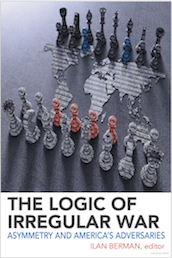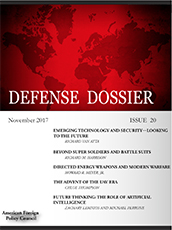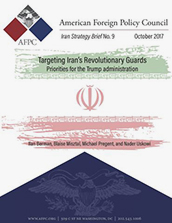Russia Reform Monitor: No. 2170
Those other "
foreign fighters"
The secret of Putin's success: Russia's "
genetic code"
Those other "
foreign fighters"
The secret of Putin's success: Russia's "
genetic code"
Shaping Syria's political future;
Kremlin outrage over Twitter ban
It's the most important Middle Eastern news story that no one is talking about.
Earlier this Fall, Egypt's state statistics agency, the Central Agency for Popular Mobilization and Statistics (CAPMAS), formally released the findings of its 2016 national census. The results shed important new light on the challenges now confronting the government of president Abdel Fatah al-Sisi in Cairo.
Science fiction is always fascinating to follow, because at least some of the ideas presented in the genre do become reality over time. The concept of "super soldiers" is a case in point. Although the protagonists in Marvel's iconic Avengers comic books (and now movies) are still a long way from being realistic, we are unquestionably trending in that direction. Thus, the character of Captain America is a soldier enhanced by the government using a special serum to make him stronger, faster and more resilient, while Iron Man is an operator encased in full body armor that affords him super human strength, advanced weapons, and extrasensory systems. Even though such enhancements are still a stretch, performance drugs, exoskeletons, and other new technologies are increasingly augmenting - and expanding - the capabilities of today's warfighters.
Securing the Kerch Strait;
More freedom of action against "
undesirable"
organizations
Syria's plight, Russia's profit;
Sobchak makes a splash
Wirelessly charging drone subs;
The Pentagon's new EW strategy;
Reconsidering "Rods from Gods";
The hazards of hacked robots;
New military applications for AI
Seventy years ago today, with the Holocaust still fresh in the minds of global leaders, the United Nations General Assembly voted overwhelmingly to partition Palestine in two, with the goal of establishing one state for Jews to reclaim their historic homeland and another for the Arabs who were also living there.
Imagine that a hostile nation - say, North Korea - fires a nuclear-tipped missile at the United States. The missile detonates in the upper atmosphere above a major American city such as Los Angeles, releasing a cascade of charged electrons that damages and destroys all technology and electrical systems within line-of-sight of the explosion. Vital infrastructure on the country's Western seaboard is incapacitated. Large swathes of California and parts of Nevada lose power. Stores, social services and emergency functions that rely on electricity begin to break down, as disorder spreads and the death toll climbs.
The problem of food security in Pakistan;
A crackdown on illegal mining in Brazil;
A spike in atmospheric carbon dioxide;
Russia's expanding global nuclear presence
Russia's media blacklist takes shape;
Another presidential contender rises... maybe
Iran's Afghan "
Volunteers"
Khatami under fire...;
...while Larijani jockeys for position;
Iran continues its illicit procurement;
A helping hand from Moscow
The start of a Russo-American media war?;
The Kremlin versus crypto-currencies
A step backward in Jakarta;
Bracing for Islamism in the Caribbean...;
...and tightening up in Bulgaria;
Thailand's turmoil provides inroads for foreign jihadists
Teaching counterintelligence in China's schools;
Some small signs of an economic opening
Kung fu meets government regulation;
In Beijing, fears of Western cultural penetration
You could call it "Extreme Makeover: Central Asian Edition." Today, among the five post-Soviet republics that make up the region, there are heartening signs of political dynamism and a newfound drive for integration.
At the center of these changes is the Republic of Uzbekistan, which has launched a far-reaching program to reform and modernize the state.
SPECIAL ISSUE: The 19th Party Congress
Though Unmanned Aerial Vehicles (UAVs, or drones) are now an essential part of the U.S. national security toolkit, military views of UAVs were less than enthusiastic when the technology first emerged. In the early days of drones, the most prominent roadblocks to widespread adoption by the armed forces were inconsistency in performance, spiking costs, and, perhaps more importantly, a significant lack of interest on the part of military leaders, who could not quite envision a tactical use for the technology and thus had little incentive to push for the investment that such systems required. Today, by contrast, UAVs are an accepted, even vital, part of military and intelligence operations.
Iran is on the march in the Middle East.
Over the past year, a steady drumbeat of news reports from the Persian Gulf, intelligence assessments regarding Syria's civil war, and firsthand accounts out of Iraq, Lebanon and beyond has pointed to an inescapable conclusion: Iran is erecting a new empire in the region.
Moscow has long sought to ensconce itself in key Venezuelan energy sectors and provide loans and weapons to the regimes of Hugo Chavez and then Nicolás Maduro so they could use this assistance to destabilize the entire continent.
The past several years have seen a remarkable transition of Artificial Intelligence (AI) from academia to practical use. This shift is beginning to transform every industry, is fundamentally changing many consumer services, and will have a profound impact on national security.
On September 25th, against the urging of the United States and other allies, the Kurdish Regional Government (KRG) held an independence referendum within the boundaries of its autonomous region and provocatively, without, in the city of Kirkuk. While the regional response was fast and furious, the United States did nothing, leaving the Iraqi Kurds at the mercy of a revengeful Baghdad: Erbil and Sulaimaniyah airports were closed to international commercial traffic. Turkey threatened to close borders and the Iranian and Iraqi militaries conducted joint exercises on the Iraqi Kurdish border. Baghdad sent the Iraqi army and Iranian-backed Shia Popular Mobilization Front (PMF) militias to retake the disputed territories back from the Kurdish peshmerga. Then, on October 29th, KRG president Masoud Barzani stepped down and suspended the post of presidency, distributing control of the KRG to other branches.
It looked like a video game. From the comfort of a living room couch, with TV dinners in hand, families watched as precision-guided munitions rained down with seemingly perfect accuracy on Iraqi military and civilian targets. It was Jan. 17, 1991 - the start of Operation Desert Storm - and the combination of camera equipped high-tech weaponry and night vision equipment provided viewers an action-packed front-row view into the coalition's air war. What had seemed like science fiction was now a reality.
In a 2009 article entitled "Technology and Warfare," Professor Alex Roland of Duke University wrote that "...technology, more than any other outside force, shapes warfare.”[1] In his article, Roland went on to explain how military technologies, while not being deterministic, open doors and provide opportunities - often referred to as 'opportunity space' in current military parlance - for the nations employing them.
Perhaps President Putin actually told President Trump that he did not meddle in last year’s election even though the overwhelming weight of evidence demonstrates intervention.
Russian hackers target NATO;
Moscow takes aim at American media
Every day seems to bring fresh revelations of an ever-expanding scope of Russia’s cyber and information war, not only against the U.S. but also against our allies in Europe as well.
China's arms sales diplomacy;
Now Beijing eyes the Arctic
No justice for soldiers' families;
How Russia sells its Syria engagement
Saudi Arabia is in the midst of a long overdue housecleaning. The mass arrests of members of the government, royals and businessmen that have taken place in recent days are unprecedented in modern times, and the country's attorney general has promised that what has taken place so far is only "phase one."
Yemen's cholera outbreak rages on;
Migration and the Middle East water shortage;
America eyes Europe's LNG market;
Water and American energy independence;
China's controversial "Great Green Wall"
Which country ranks as the largest source of foreign fighters for the Islamic State's "caliphate" in Syria and Iraq?
That dubious distinction doesn't belong to a Middle Eastern state, despite the fact that countries such as Saudi Arabia have historically been major contributors of radicals to the Islamic State's ranks. Nor is it a North African nation, even though Tunisia had previously served as the preeminent supplier of fighters for the Syrian front.

For the United States, asymmetric warfare has emerged as the “new normal.”
Legislating loyalty in Xinjiang;
Soccer as a sign of protest

Emerging Technology And Security—looking To The Future
Beyond Super Soldiers And Battle Suits
Directed Energy Weapons And Modern Warfare
The Advent Of The UAV Era
Future Thinking: The Role Of Artificial Intelligence
The U.S.-Turkish relationship has recently become so bad that analysts in both countries now wonder if it is beyond repair.
Where have Wuhan's students gone?;
Taiwan-Singapore military ties under pressure
Ireland on Alert;
Target: America;
The Islamist timber trade;
The persistence of Palestinian "resistance"
Russia's role in the foreign fighter program
Neither Ukraine nor its well-wishers abroad can afford the luxury of despair over its prospects for reform. Instead, all parties must redouble their efforts to keep the pressure on to help Ukraine move in the direction that its citizens have already marked for themselves.
Politicizing combat in Niger doesn't make us safer.
Three major events have begun to clarify the next phase of the Middle East’s position in world affairs...[c]learly the big winners are not the U.S. but rather Russia and Iran, despite President Trump’s announcement of a new campaign against Iran.
Flying Russia's unfriendly skies;
Generational change among Russia's governors
In his policy speech last Friday, President Trump did not scrap the 2015 nuclear deal with Iran, as some prominent conservative thinkers had suggested he should. Nor did he simply leave the deal intact, as proponents of the agreement had previously counseled. Instead, the president charted a middle way intended to give America greater leverage over Iran's nuclear program and processes.

The passage this summer of the Countering America’s Adversaries Through Sanctions Act, a wide-ranging legislative package that imposed new economic pressure on Russia, Iran and North Korea, reignited the debate over U.S. policy toward the Islamic Republic.
You wouldn't know it from the media coverage surrounding President Trump's October 13th speech on Iran, but the most notable element of the Administration's new, "comprehensive" strategy toward the Islamic Republic isn't its plan to revisit the 2015 nuclear deal formally known as the Joint Comprehensive Plan of Action (JCPOA).
[Russia's] attacks on U.S. and European political and economic actors and institutions fit in with Moscow’s larger strategy of subverting governments and unnerving potential opponents.
Perhaps United Nations Secretary General Antonio Guterres, who called Palestinian Authority President Mahmoud Abbas to congratulate him on the new unity deal between Abbas' Fatah Party and the terrorist group Hamas, simply didn't know what Hamas had said about it a day earlier.
The Kremlin doubles down on the Donbas;
A looming showdown in Syria